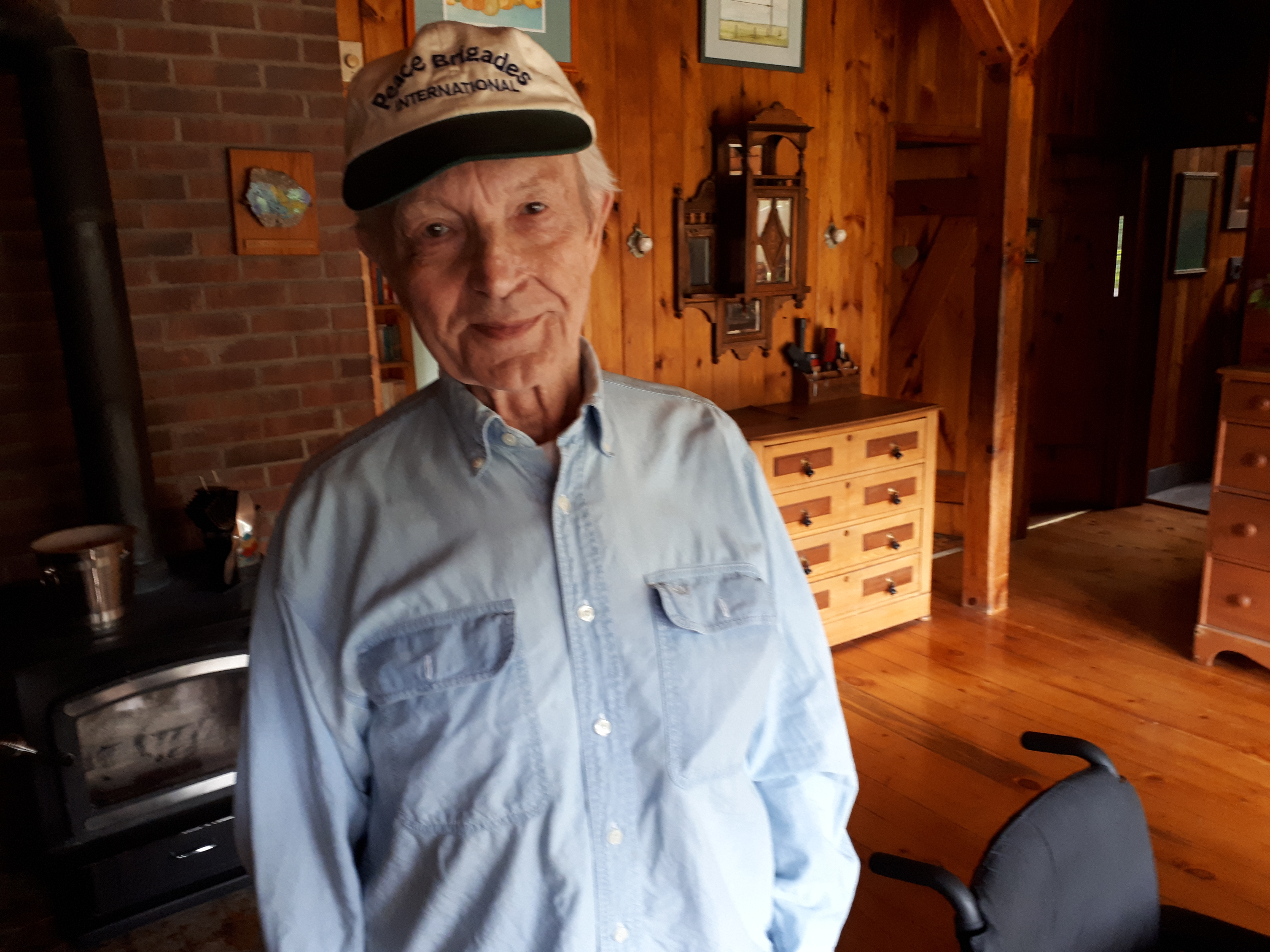At 90 years of age, Hans Sinn continues to live a life dedicated to peace.
This commitment can be traced back to his childhood experiences in wartime Germany.
As a teenager, Sinn witnessed the death and destruction that came with the bombing of his home city of Hamburg during the Second World War.
In July 1943, when Sinn was 14 years old, a one week-long Allied campaign dropped 9,000 tons of bombs on that city killing 42,600 civilians, wounding 37,000 more and destroying more than 250,000 homes.
Hamburg was targetted by air raids another 69 times before the end of the war. Sinn’s home was hit by bombs three times during the war.
His worldview was also shaped by his experience as a child soldier.
In 1945, at the age of 16, Sinn was conscripted into the Volkssturm (people’s storm). That was a last-ditch effort by Nazi Germany that saw boys under 18-years of age drafted as child soldiers in the final months of the war.
Sinn found himself at an SS training camp in Denmark.
He escaped from that camp in May 1945 and started walking back to his home in Hamburg. Given the level of wartime destruction he witnessed, Sinn did not even know if his home would still be there.
When Sinn did arrive home, after about a week of walking, he saw the contrasting images of an unexploded bomb lodged in his front yard and his mother waiting for him holding a cake in her hands.
After the war, Sinn migrated to Canada to gain perspective on his early-life experiences.
Sinn returned to Germany in 1959 to speak about his vision for a Ziviler Friedensdienst, a civil peace service. That work planted a seed that would come to fruition forty years later as a global programme funded by the German government.
By the early 1960s, Sinn was journeying across countries again.
On August 22, 1962, the Prince George Citizen reported on its front-page, “Two B.C. men plan to walk from Vancouver to Berlin — in the cause of peace. Hans Sinn, 33, of White Rock, intends to start the jaunt October 1.”
That “jaunt” would take two years to complete.
It was on that walk that Sinn met Marian Bedoukian in January 1963 in Montreal. They married in England and would eventually have two sons, Anthony and Nicholas. They later joined a land cooperative outside of Perth, a small community near Ottawa, in 1970.
Over the years, Sinn has formed a number of significant friendships, including with Petra Kelly, who co-founded Die Grünen, the German Green Party, in 1979. They shared the dream of a reunified and disarmed East and West Germany.
Another friend Sinn met in his lifelong journey of making space for peace was Quaker peace activist Murray Thomson.
In August-September 1981, both Sinn and Thomson were participants at the meeting on Grindstone Island, which is situated about 100 kilometres southwest of Ottawa, that founded the human rights group Peace Brigades International.
The inaugural statement of the new organization envisioned by Sinn and Thomson declared: “We are forming an organization with the capacity to mobilize and provide trained volunteers in areas of high tension, to avert violent outbreaks.”
Almost 40 years later, Peace Brigades International is a global organization with an international office based in Brussels, seven field projects — in Colombia, Mexico, Honduras, Guatemala, Kenya, Nepal and Indonesia — that work directly with at-risk human rights defenders, and 13 country groups, including PBI-Canada, based in Ottawa.
In its 2018 annual review, PBI’s International Council president Fathi Zabaar highlights, “Physical accompaniment provided by PBI to over 1,000 human rights defenders ensured they could continue and expand their work.”
And that vision of a Civil Peace Service that Sinn began championing in 1959?
Since the formation of the CPS in 1999, more than 1,200 experts have supported peacebuilding efforts in 60 countries around the world. It is also a significant funder of the human rights work done by Peace Brigades International.
The German Federal Ministry for Economic Cooperation and Development highlights, “CPS is an initiative of German peace and development organizations. …CPS experts provide support worldwide in crisis regions, helping local partner organizations to build a basis for lasting peace.”
Now, Sinn is focused on the issue of child solders.
It has been estimated that there are about a quarter of a million child soldiers used by state and non-state military organizations in at least 18 armed conflicts worldwide. Child soldiers have been used in two countries where PBI has field projects, Colombia and Mexico.
Sinn wants to convince the German government to fund global child-care at the same level at which it maintains its military.
That would mean an allocation of more than USD $46 billion in public funds annually toward much needed child-care and result in a profound improvement in the lives of women, children and families around the world.
While the realization of that dream may be years away, there is something about the passion, dedication and intellect that Sinn brings to it that would make even the most skeptical observer a firm believer that one day this vision will also become a reality.
Brent Patterson is a political activist, writer, and the Executive Director of Peace Brigades International-Canada.
Image: Brent Patterson
Make rabble sustainable. Please consider supporting our work with a monthly donation and join us as we take on the 2019 election. Support rabble.ca today for as little as $1 per month!




